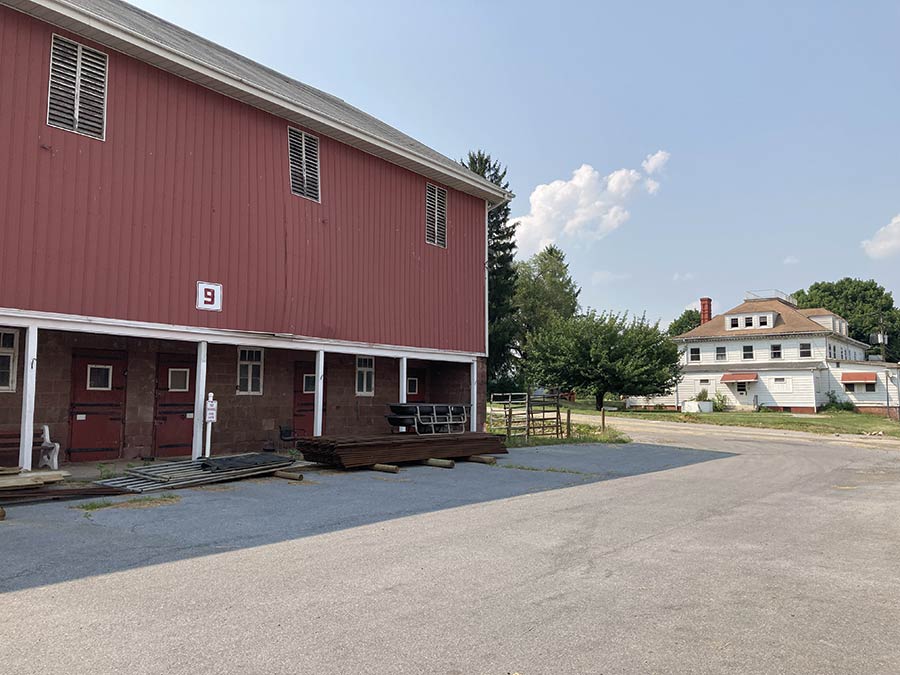 The Quentin Riding Club’s historic bank barn (foreground) will be dismantled and moved. The 100+ year old club house in the background will be demolished. All photos by Amy Worden.
The Quentin Riding Club’s historic bank barn (foreground) will be dismantled and moved. The 100+ year old club house in the background will be demolished. All photos by Amy Worden.
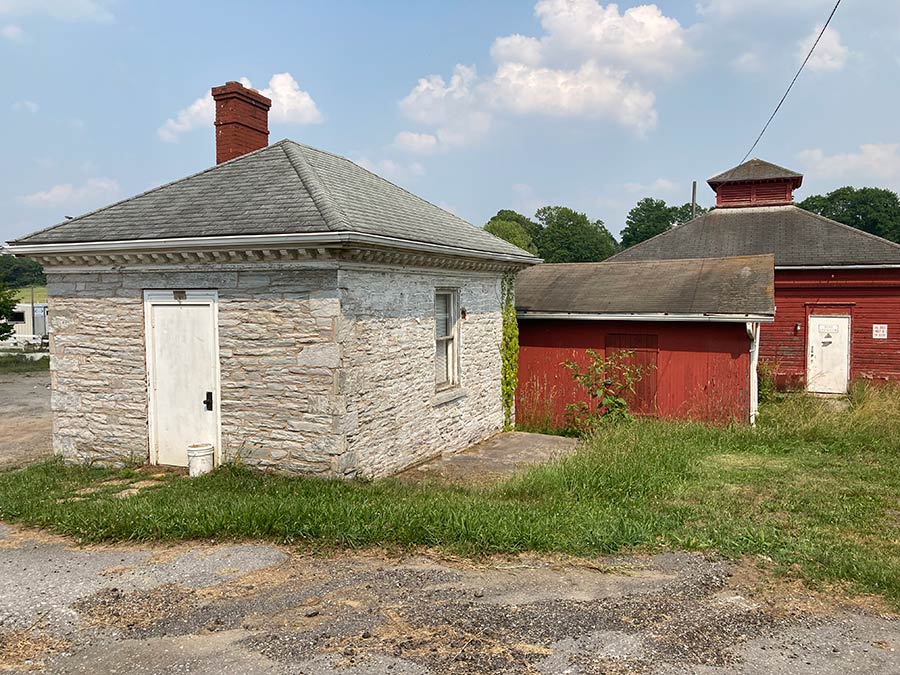 The stone blacksmith shop at the Quentin Riding Club will be one of three buildings that will be saved. The building used for rest rooms will be another.
The stone blacksmith shop at the Quentin Riding Club will be one of three buildings that will be saved. The building used for rest rooms will be another.
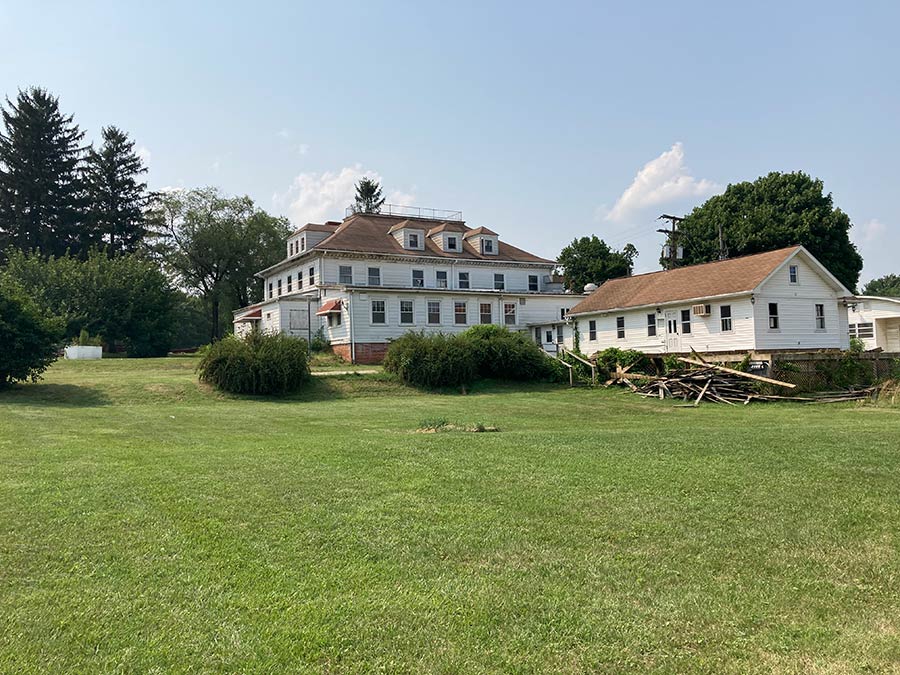 The Quentin Riding Club club house and Bit and Spur tavern as they appeared in July 2021. Both will be demolished.
The Quentin Riding Club club house and Bit and Spur tavern as they appeared in July 2021. Both will be demolished.
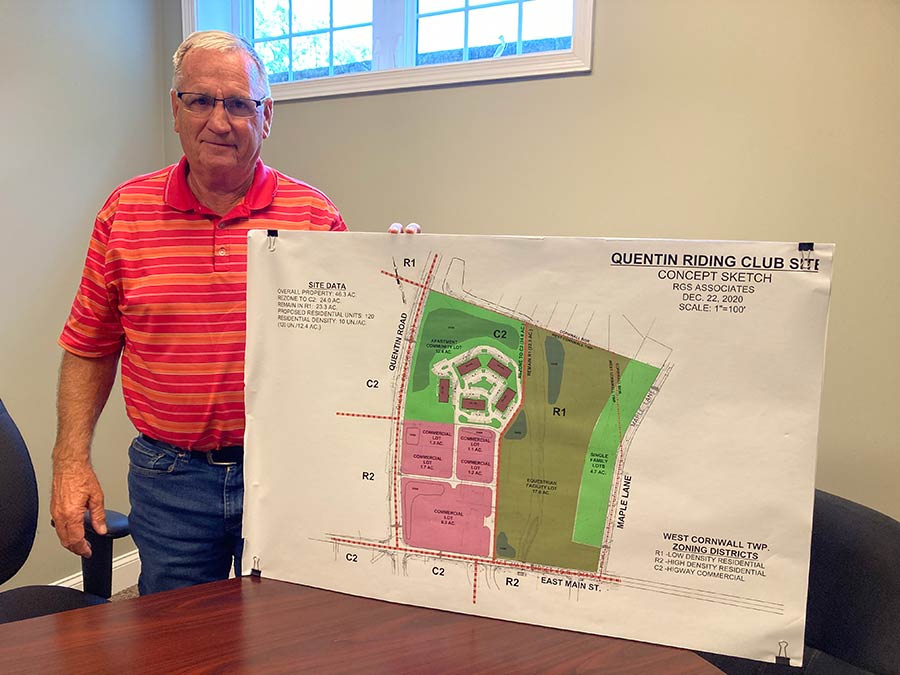 Developer Louis Hurst with the plan for developing the former Quentin Riding Club. The 17.6 acres that are planned to house an equine therapy center for veterans is shown at R1 in brown.
Developer Louis Hurst with the plan for developing the former Quentin Riding Club. The 17.6 acres that are planned to house an equine therapy center for veterans is shown at R1 in brown.
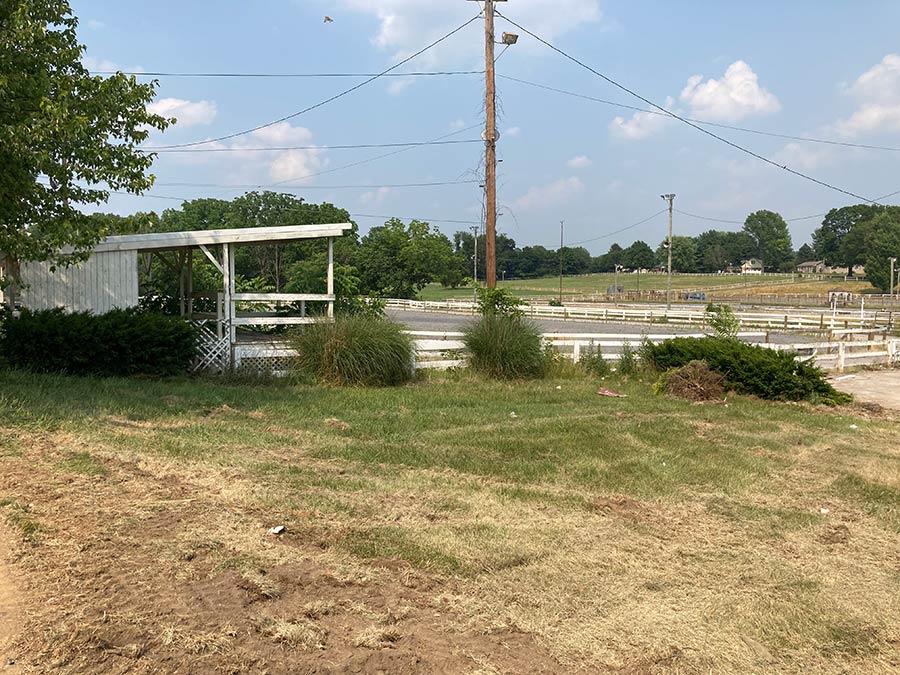 The Quentin Riding Club show ring and grandstands as they appeared in July 2021. All are slated for demolition.
The Quentin Riding Club show ring and grandstands as they appeared in July 2021. All are slated for demolition.
The Quentin Riding Club, the storied and deeply-loved show grounds in Lebanon County, PA may soon have a new life - one that includes horses.
Local developer Louis Hurst, who purchased the 44-acre site for $2.1 million in 2019, told East Coast Equestrian he plans to develop a little more than half the site, while reserving almost 18 acres to build a therapeutic horse center for veterans.
“My wife and I have the heart and vision to do something for veterans,” said Hurst. “It takes a part of history and lets it stay there while meeting a real need out there. Something good will come of it.”
Shortly after purchasing the property, Hurst and his wife, Sharon, saw a TV program that profiled a female veteran who said her life was saved by equine therapy. That inspired Hurst. “I thought, wouldn’t it be cool to do something like that?”
Hurst said he has had discussions with Dave Anderson of Building Bridges Foundation, an equine-assisted therapy program for veterans in Lancaster County, who encouraged him to form a nonprofit to address a growing need for veterans suffering from mental and physical trauma. The club property is only a few miles from Pennsylvania’s largest Veterans Administration center.
Hurst said he will formally present his proposal to the West Cornwall Township Board of Supervisors at its Aug. 9 meeting with the goal of opening the veterans’ facility by 2023. Hurst said he will need a zoning variance approved to develop the five commercial lots at the intersection of Rt. 72 and Main St. because the property is zoned residential. He also is planning a 120-unit apartment complex for seniors.
The Quentin Riding Club, formed in 1935, was for decades the premier outdoor horse show venue in central Pennsylvania. Between May and Labor Day weekend, the show grounds were always busy, said Ed Krause, whose father, Bob, was president of the club for many years.
The club hosted A-rated hunter/jumper, Saddlebred, Morgan, Arab and other breed shows, drawing competitors from as far as New England and the Midwest, along with Wednesday night fun shows that appealed to locals.
The historic buildings on the property, including a bank barn and the large clubhouse, which is more than 100 years old, along with a covered grandstand and a number of mature trees gave the property character and made the atmosphere inviting even in the hottest months.
Krause, 64, said he spent a good part of his youth at Quentin showing hunters and later Saddlebreds.
Later in life, Krause said, “even when I was horseless, I was still a member and I’d still go to the shows.”
Three generations of the Sweigart family showed their Hackney ponies and Saddlebreds at Quentin for more than six decades, beginning with Clarence Sweigart in the mid-1950s.
“It meant a lot to us as a family,” said Marlene Sweigart, who with her husband Galen showed at Quentin for many years and whose daughter Brook now runs Sweigart Stables in Denver, Lancaster County. “We’d take the camper and stay overnight.”
She said the loss of the show venue has left the area without a local show grounds.
The Quentin Riding Club held its last show in 2018. The 18 buildings on the property, including the historic clubhouse and bank barn along with eight other barns, fell into disrepair.
Hurst has permits to demolish all the structures and has already dismantled the indoor arena, which will be reused by Little Springs Farm, a therapeutic riding program in Lancaster County. The historic bank barn will be taken down and reassembled elsewhere by an Amish company. Hurst said he will preserve three small outbuildings: two red frame buildings, including one where restrooms were located, and the stone structure known as the blacksmith shop.
Hurst said he is planning to demolish the other structures, including the clubhouse, because they were “too far gone” to restore and that he will build a new barn for his therapy program.
For now, horse trainer Judah Bauman is leasing part of the facility for his business, Diamond B Horsemanship, which starts young racehorses and trains horses in Western and other disciplines. Hurst hopes Bauman will stay on as he transitions the property as part of his equine facility.
Krause said the decline of the Quentin Riding Club has been difficult to watch, but he doesn’t begrudge Hurst his ability to develop the property and thinks the veterans’ facility is a good idea.
“We have to be realists; that’s progress,” he said. “It’s unfortunate that it couldn’t be preserved and maintained, but just financially they couldn’t do it.”
Sweigart too said she thinks the veteran equine facility is “a good thing” since “17 acres will stay in the horse world.”
But both said they will miss the old Quentin of days gone by when the show rings were full, the grandstand was packed with cheering crowds and the atmosphere was electric.
“Quentin was the prize of the show world,” said Krause. “So many world champions showed here that today people don’t even know about.”
An auction last November selling architectural elements from the buildings, and even stones from the old stone wall that lined the walk to the rings, raised $20,000 for the local fire company.
Krause said he went to the property auction but did not attend the 2020 auction. “I couldn’t stand to go,” he said. “It was too heartbreaking.”




